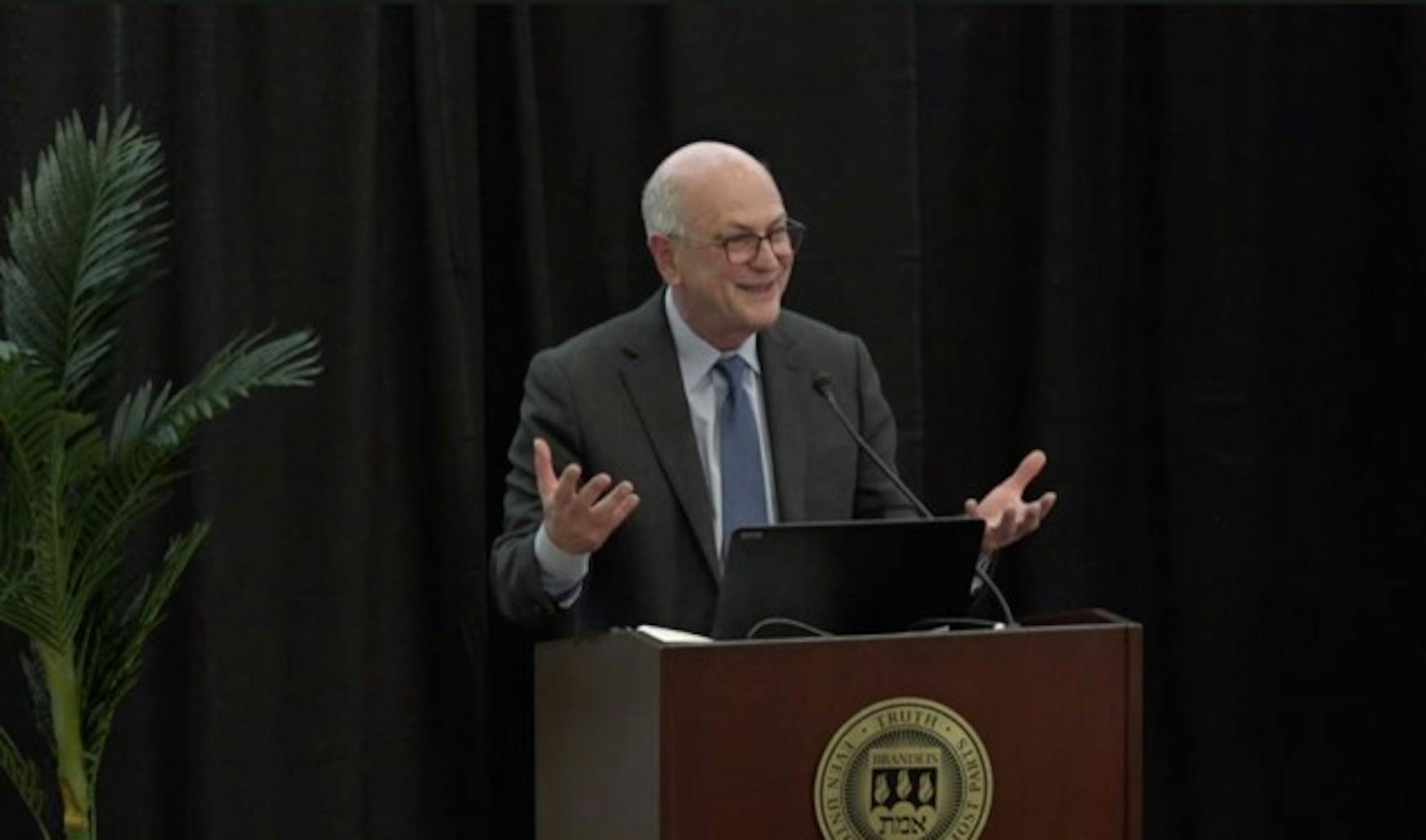Ecologist Peter Frumhoff lectures on environmental activism
Frumhoff, the 2022 Richman Fellow, engaged with students and lectured on climate change.
Peter Frumhoff is a prominent environmental activist who has helped bring global attention to issues related to climate change. He spoke to the Brandeis community on March 30 on a broad range of environmental-related topics, including the history of environmental activism, the impact capitalism has on climate change, what passionate students can do to make a difference, and how to stay positive when working in a field that is so often discouraging.
Frumhoff was named the 2022 Richman Distinguished Fellow in Public Life in October 2021 and spent three days on campus, from March 29 through March 31, when he accepted his award and gave a lecture to the Brandeis community. The lecture was titled “From Science to Action on Climate Change” and took place on Wednesday, March 30.
Frumhoff is the Director of Science and Policy as well as the Chief Climate Scientist at the Union of Concerned Scientists, and he is currently taking a sabbatical at the Harvard University Center for the Environment. Frumhoff was a leading contributor to the Fourth Assessment Report of the Intergovernmental Panel on Climate Change, which won the Nobel Peace Prize in 2007, among many other reports. He is currently a board member of a variety of different non-profit organizations and environmental journals.
Frumhoff has taught at Harvard University, the University of Maryland, and the Fletcher School of Law and Diplomacy at Tufts University. He also held the position of the 2014 Cox Visiting Professor in the School of Earth Sciences at Stanford University.
To kick off the lecture, Frumhoff began by discussing the history of environmental activism, dating environmental activism and policy work back as early as 1965, if not earlier, when scientists explained the dangers of carbon emissions and their effects on the environment to former President Lyndon B. Johnson. He explained that the government has known about the potential harm of climate change for decades, but very little action has been taken. Frumhoff also displayed a chart of carbon emission levels during the years between 1960 and 2020, which showed the exponential growth of carbon emission levels.
Frumhoff spent a lot of time focusing on the future of environmental activism and policies, on the individual level as well as the bureaucratic, ranging from education to infrastructure. He emphasized that although individual efforts may seem futile at times, and can often be discouraging, individual action is important and impactful.
Frumhoff addressed Brandeis’ Climate Action Plan, drafted by the President’s Task Force on Campus Sustainability and adopted in May 2021 by President Ron Liebowitz. The overall plan included many steps the University could take to minimize its carbon footprint.
Some examples include, but are not limited to, adopting a carbon mitigation plan, prioritizing sustainability when choosing a new dining vendor, subsidizing public transportation options for students, and improving water conservation and management. The plan also focused on education, specifically implementing a climate literacy requirement for all undergraduate students; the creation of the Climate Justice, Science, and Policy minor; and making the 2021-22 academic year the “Year of Climate Change at Brandeis.”
While Frumhoff praised Brandeis for taking these steps, he ended his speech by urging Brandeis to do more. “This is not just the year of climate action,” he said, “but the decade of climate action.” He encouraged the University to think beyond this one year, and suggested a more ambitious goal that Brandeis should aim for: laying out a vision for emissions reductions across the University.
The floor was then opened up for questions from the audience, many of which came from students.
Frumhoff was asked how he stays hopeful and positive about the future of the world and the future of climate change when it can be so frustrating and disheartening at times. Frumhoff acknowledged that grief regarding climate change is real but declared that “the antidote to grief is engagement.” He told the audience to stay engaged with communities that care about the environment and to partake in environmental activism.
He emphasized that the issue is difficult to grapple with at times, and people should stay aware of when it gets to be too much for them and allow themselves time to recharge and step away from the issue when it feels necessary.
Frumhoff was asked about his opinions on the notion that there is “no ethical consumption under capitalism,” and he agreed that the capitalist system we live under is continuing to drive a disruption of natural resources that is difficult to break out of without radical change. However, he stated that he feels optimistic that change truly can occur since the government works under the framework of a capitalist society, and the policies introduced and implemented all work to make real change within a capitalist world.
The last question posed to Frumhoff was regarding the kinds of leaders he thinks will be necessary for the future, specifically the kinds of leadership positions that college students who truly care about the environment can strive for. Frumhoff stated that college students can begin right now, stating that education and activism on college campuses are hugely important and often result in real change being implemented. He said that there is no shortage of opportunities for passionate students to be engaged but acknowledged that it might be difficult to figure out what path to take. His advice was to “follow the things that bring you the most joy. That might be technical or scientific or regarding social engagement. But focus on what you are passionate about, and the career opportunities will follow.”



Please note All comments are eligible for publication in The Justice.